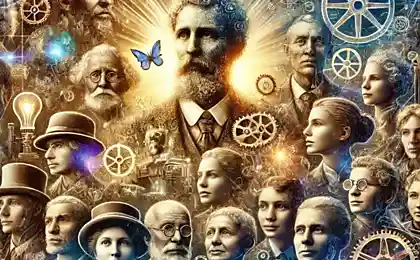459
Healthy selfishness: why to take care of their own interests is totally ethical
We formulate their view of the world by means of concepts. But in our everyday life there is no concept of "good" selfishness. The definition that should apply to the honest arbiters of their own fate, is transferred to unprincipled drones.
The authentic definition of selfish ("to act in their own interest, obeying the voice of reason") cleverly removed from our vocabulary. And it's not just an error of altruists is a real fraud, a monstrous distortion of the facts, which left the language of the concepts that could be operated when comparing altruism with selfishness. Altruism is always good and selfishness is bad. Missing the field for discussions about how well or not to be selfish. The concept of intelligent, creative and independent person slandered and removed from our daily lives.
Their lies altruistic brighten the argument that the selfish — being indifferent and insensitive that he only cares about the money, that friendship and love are incompatible with the pursuit of personal interests and that all selfish — being fixated on themselves misanthropes. In fact, a vested interest can be both material and spiritual. Judge for yourself: the fact that you have a friend or loved one gives you a lot of advantages. We communicate only with those people that we need. We love only those who are dear to us. And if suddenly, after listening altruists, you will be smitten with love for the stranger (if such a thing possible), that would be a truly selfless act! To love a stranger, and especially the enemy — this requires complete self-denial. But true love is always selfish. It is not handed out right and left as alms. Imagine this: you explain to someone in love not because of what they see in the beloved a lot of advantages, but just out of pity. This is absurd. Love has nothing to do with charity. We love because this person is invaluable to us. And this love gives us endless joy. To love, to desire to live life with a man who embodies for us all the most beautiful in the world, is a very personal and selfish choice. And just rude and dishonest altruist is able to turn everything on its head, calling the love and friendship, sacrificial relationships.
Eighty six million five hundred eight thousand four hundred seventy eight
Peter Schwartz, "In defense of selfishness»
Altruists have distorted not only the concept "selfishness". They have their own, specific notion of sacrifice. What do you mean "donate"? It is unlikely to mean just something to give to someone. If we give the seller money in the store to buy groceries, it's just a deal. In this case we give less value (money) for more (products). The sacrificial act means the exact opposite: we give great value in exchange for something that generally is not of value to us. To sacrifice means to suffer loss and that is why altruistic and consider sacrifice a virtue. If a high school student distracted from studying, forcing to wash the floors in the school cafeteria, he is forced to make a sacrifice. If the mother tells the son to give his favorite toy to the Tomboy that is sure to break it for you — it requires the victim's son.
A simple worker, popping drunken tramp of their income (it suddenly took over the life that someone lives worse than him), also sacrifices. Can you give an example of the many acts committed to the detriment of their own interests for the benefit of others.
More and more. The rejection of today's pleasures for future benefits is also called altruistic self-sacrifice. But if someone works hard to become an outstanding neurosurgeon or the violinist, and the victim here? Nothing to do with it. On the contrary, to plan your life so that in the future to get the most out of (both in the material and in the spiritual sense), means to act like a real reasonable selfish. To sacrifice a rook to take the Queen, not weak, but rather a very strong move. Now, if you want to play in the giveaway out of pity for the weak enemy, then this step may be called a victim. Soldiers going to war, when the enemy crossed the border, brings no casualties. It just protects the aggressor from their freedom and their loved ones. But if it is sent to the edge of the world with the so-called "humanitarian mission" (for example, to stop the tribal slaughter), his act can be called a victim, because the conflict in a distant country absolutely does not affect his personal interests.
"From the point of view of altruists, the rejection of immediate gratification for future benefits — sacrifice and the rejection of future benefits in favor of immediate pleasure, or selfishness" Altruists do not see the difference between very different things. An investment in your future (today you put a dollar in the future, get two) they call sacrifice. But this pattern of behavior is fundamentally different from the real sacrificial act, when you give your two dollars forever becoming "brother's Keeper".
From the point of view of altruists, the rejection of immediate gratification for future benefits — sacrifice and the rejection of future benefits in favor of immediate pleasure, or selfishness. In the newspaper we read an article about a football team, entitled "blame selfish". A reporter asked players about the reasons for the huge number of defeats in a season. The responses we constantly hear the word "selfishness". "While some guys sit at home and gain strength, study the game plan, scroll to a video work other all night and hanging around in bars and making trouble". These the Goonies "teammates considered selfish."
So, to get drunk until you're blue, the next day to screw up the game, it's selfish and sit at home, not touching alcohol to achieve a victory — denial.
The company, which on its own short-sightedness cut the branch on which you sit, has been accused of selfishness. Business trying to save on the quality of the product and in result lose customers and go bankrupt, I consider it selfish. Attila with his thoughtless, without regard to the consequences, the pursuit of profit, or his refined brother bled with his crazy antics today considered the epitome of selfishness — and this despite the fact that the lies and the violence are returning, like a boomerang, do not serve personal interests and did not benefit in the future. But if you already starting to think about tomorrow and about the future benefits, if you aim to move forward and think rationally, altruists would say that you're "sacrificing yourself".
To date, there are no clear definitions of important concepts related to morality, and vague definitions only aggravate the situation. Under egoism you know not care about personal interests (the concept of ethics), and the behavior of barbarians and rogues.
Sacrifice do not consider the exchange of a certain value that value is not, and the rejection of momentary pleasure. Altruism is not defined as a subordination of oneself to others, and identify with love and respect. Alas, we have to admit that in the minds of people confusion reigns, which makes them vulnerable to the tyranny of altruism.
On the key question of why to take care of own life is immoral and another is moral, altruism does not give any, even the most confusing answer. Man is a predator is selfish, they say, and the question of why the true selfishness is considered evil, hangs in the air.
Seventy million nine hundred seventy thousand three hundred two
But if we persevere and try to dispel the fog Shrouding our view of morality, we suddenly see that the calls for sacrifice are without any logical reason. There is no excuse neither physical nor moral slavery. It is impossible to give any convincing argument in favor of the fact that man must subordinate his life to serving others. Our life belongs to us and nobody has the right to infringe upon it.
But if altruists are not able to give any reasonable arguments in favor of his approach what do they rely on? Altruism is looking for support in the field of the irrational. To demand sacrifices for the good of others is to tell stories about the afterlife and about the fact that water can turn into wine. Here we are dealing not with facts and logic, and with their opposite — blind faith.
The concept of "altruism" was formulated by the French philosopher of the nineteenth century by Auguste Comte. He perfectly understood the meaning of this term, defining it as a "religion of humanity". Justifying your approach to ethics, he wrote about a "fundamental and undeniable doctrine" which is that "the heart must serve the mind." His approach becomes clear from the following statements: "Every postulate, lays claim to universality can be displayed exclusively from the realm of the senses."
In other words, we are asked to be altruistic, guided not by reason and the senses. Our notions of morals we need to not empirically, but by intuition, not by knowledge, but through faith, not because there is some sense, and despite the fact that it is not.
Altruistic doctrine belittles the role of the mind, and people start to believe that it will turn into till, if you start to live for yourself. We constantly offer a false choice — either you live at the expense of others, or allow someone to take you on the neck. If you constantly repeat that to pursue personal interests — bad and ugly, and to sacrifice herself for others, useful and noble, people are confused. They begin to believe that the scope of morality at all beyond reason, and give up, deciding that the moral choice requires the rejection of free will.
Sowing all this confusion in the minds of the altruists rather rubbing their hands. Do not try to understand morality with the mind, they assert. Moral truth does not come from the mind and from the heart. The mind is powerless here. There's no explanation necessary — just believe. Believe? Into what? That we must submit ourselves to other people's needs. This requires of us society.
The code of the altruist does not even hint at the rationale that we have to sacrifice himself. Moreover, altruists deny the very need for at least some clear answer to this question. If a recognized authority announces self-sacrifice a virtue, it is useless to argue. Auguste Comte joyfully welcomed Christianity with its "subordination of reason to faith", for faith, in his opinion, "there's work to Mankind." In other words, you just need to force myself to believe in the necessity of self-sacrifice. You need to lie down and take it, no questions asked.
If the code of altruism to clean up the gibberish, it turns out that there's nothing else there.
Source: theoryandpractice.ru
The authentic definition of selfish ("to act in their own interest, obeying the voice of reason") cleverly removed from our vocabulary. And it's not just an error of altruists is a real fraud, a monstrous distortion of the facts, which left the language of the concepts that could be operated when comparing altruism with selfishness. Altruism is always good and selfishness is bad. Missing the field for discussions about how well or not to be selfish. The concept of intelligent, creative and independent person slandered and removed from our daily lives.
Their lies altruistic brighten the argument that the selfish — being indifferent and insensitive that he only cares about the money, that friendship and love are incompatible with the pursuit of personal interests and that all selfish — being fixated on themselves misanthropes. In fact, a vested interest can be both material and spiritual. Judge for yourself: the fact that you have a friend or loved one gives you a lot of advantages. We communicate only with those people that we need. We love only those who are dear to us. And if suddenly, after listening altruists, you will be smitten with love for the stranger (if such a thing possible), that would be a truly selfless act! To love a stranger, and especially the enemy — this requires complete self-denial. But true love is always selfish. It is not handed out right and left as alms. Imagine this: you explain to someone in love not because of what they see in the beloved a lot of advantages, but just out of pity. This is absurd. Love has nothing to do with charity. We love because this person is invaluable to us. And this love gives us endless joy. To love, to desire to live life with a man who embodies for us all the most beautiful in the world, is a very personal and selfish choice. And just rude and dishonest altruist is able to turn everything on its head, calling the love and friendship, sacrificial relationships.
Eighty six million five hundred eight thousand four hundred seventy eight
Peter Schwartz, "In defense of selfishness»
Altruists have distorted not only the concept "selfishness". They have their own, specific notion of sacrifice. What do you mean "donate"? It is unlikely to mean just something to give to someone. If we give the seller money in the store to buy groceries, it's just a deal. In this case we give less value (money) for more (products). The sacrificial act means the exact opposite: we give great value in exchange for something that generally is not of value to us. To sacrifice means to suffer loss and that is why altruistic and consider sacrifice a virtue. If a high school student distracted from studying, forcing to wash the floors in the school cafeteria, he is forced to make a sacrifice. If the mother tells the son to give his favorite toy to the Tomboy that is sure to break it for you — it requires the victim's son.
A simple worker, popping drunken tramp of their income (it suddenly took over the life that someone lives worse than him), also sacrifices. Can you give an example of the many acts committed to the detriment of their own interests for the benefit of others.
More and more. The rejection of today's pleasures for future benefits is also called altruistic self-sacrifice. But if someone works hard to become an outstanding neurosurgeon or the violinist, and the victim here? Nothing to do with it. On the contrary, to plan your life so that in the future to get the most out of (both in the material and in the spiritual sense), means to act like a real reasonable selfish. To sacrifice a rook to take the Queen, not weak, but rather a very strong move. Now, if you want to play in the giveaway out of pity for the weak enemy, then this step may be called a victim. Soldiers going to war, when the enemy crossed the border, brings no casualties. It just protects the aggressor from their freedom and their loved ones. But if it is sent to the edge of the world with the so-called "humanitarian mission" (for example, to stop the tribal slaughter), his act can be called a victim, because the conflict in a distant country absolutely does not affect his personal interests.
"From the point of view of altruists, the rejection of immediate gratification for future benefits — sacrifice and the rejection of future benefits in favor of immediate pleasure, or selfishness" Altruists do not see the difference between very different things. An investment in your future (today you put a dollar in the future, get two) they call sacrifice. But this pattern of behavior is fundamentally different from the real sacrificial act, when you give your two dollars forever becoming "brother's Keeper".
From the point of view of altruists, the rejection of immediate gratification for future benefits — sacrifice and the rejection of future benefits in favor of immediate pleasure, or selfishness. In the newspaper we read an article about a football team, entitled "blame selfish". A reporter asked players about the reasons for the huge number of defeats in a season. The responses we constantly hear the word "selfishness". "While some guys sit at home and gain strength, study the game plan, scroll to a video work other all night and hanging around in bars and making trouble". These the Goonies "teammates considered selfish."
So, to get drunk until you're blue, the next day to screw up the game, it's selfish and sit at home, not touching alcohol to achieve a victory — denial.
The company, which on its own short-sightedness cut the branch on which you sit, has been accused of selfishness. Business trying to save on the quality of the product and in result lose customers and go bankrupt, I consider it selfish. Attila with his thoughtless, without regard to the consequences, the pursuit of profit, or his refined brother bled with his crazy antics today considered the epitome of selfishness — and this despite the fact that the lies and the violence are returning, like a boomerang, do not serve personal interests and did not benefit in the future. But if you already starting to think about tomorrow and about the future benefits, if you aim to move forward and think rationally, altruists would say that you're "sacrificing yourself".
To date, there are no clear definitions of important concepts related to morality, and vague definitions only aggravate the situation. Under egoism you know not care about personal interests (the concept of ethics), and the behavior of barbarians and rogues.
Sacrifice do not consider the exchange of a certain value that value is not, and the rejection of momentary pleasure. Altruism is not defined as a subordination of oneself to others, and identify with love and respect. Alas, we have to admit that in the minds of people confusion reigns, which makes them vulnerable to the tyranny of altruism.
On the key question of why to take care of own life is immoral and another is moral, altruism does not give any, even the most confusing answer. Man is a predator is selfish, they say, and the question of why the true selfishness is considered evil, hangs in the air.
Seventy million nine hundred seventy thousand three hundred two
But if we persevere and try to dispel the fog Shrouding our view of morality, we suddenly see that the calls for sacrifice are without any logical reason. There is no excuse neither physical nor moral slavery. It is impossible to give any convincing argument in favor of the fact that man must subordinate his life to serving others. Our life belongs to us and nobody has the right to infringe upon it.
But if altruists are not able to give any reasonable arguments in favor of his approach what do they rely on? Altruism is looking for support in the field of the irrational. To demand sacrifices for the good of others is to tell stories about the afterlife and about the fact that water can turn into wine. Here we are dealing not with facts and logic, and with their opposite — blind faith.
The concept of "altruism" was formulated by the French philosopher of the nineteenth century by Auguste Comte. He perfectly understood the meaning of this term, defining it as a "religion of humanity". Justifying your approach to ethics, he wrote about a "fundamental and undeniable doctrine" which is that "the heart must serve the mind." His approach becomes clear from the following statements: "Every postulate, lays claim to universality can be displayed exclusively from the realm of the senses."
In other words, we are asked to be altruistic, guided not by reason and the senses. Our notions of morals we need to not empirically, but by intuition, not by knowledge, but through faith, not because there is some sense, and despite the fact that it is not.
Altruistic doctrine belittles the role of the mind, and people start to believe that it will turn into till, if you start to live for yourself. We constantly offer a false choice — either you live at the expense of others, or allow someone to take you on the neck. If you constantly repeat that to pursue personal interests — bad and ugly, and to sacrifice herself for others, useful and noble, people are confused. They begin to believe that the scope of morality at all beyond reason, and give up, deciding that the moral choice requires the rejection of free will.
Sowing all this confusion in the minds of the altruists rather rubbing their hands. Do not try to understand morality with the mind, they assert. Moral truth does not come from the mind and from the heart. The mind is powerless here. There's no explanation necessary — just believe. Believe? Into what? That we must submit ourselves to other people's needs. This requires of us society.
The code of the altruist does not even hint at the rationale that we have to sacrifice himself. Moreover, altruists deny the very need for at least some clear answer to this question. If a recognized authority announces self-sacrifice a virtue, it is useless to argue. Auguste Comte joyfully welcomed Christianity with its "subordination of reason to faith", for faith, in his opinion, "there's work to Mankind." In other words, you just need to force myself to believe in the necessity of self-sacrifice. You need to lie down and take it, no questions asked.
If the code of altruism to clean up the gibberish, it turns out that there's nothing else there.
Source: theoryandpractice.ru























